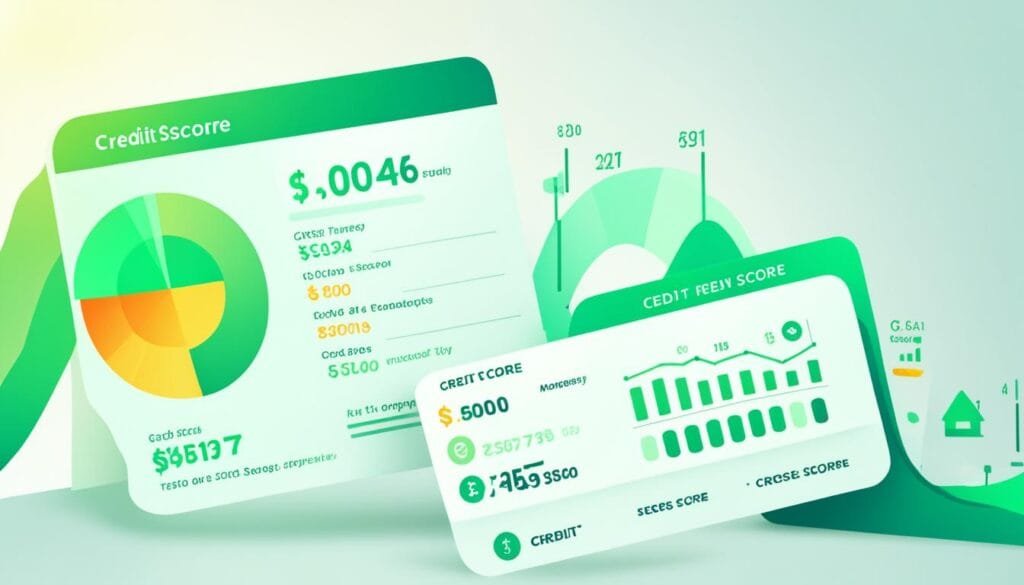Improving your credit score is a key step in achieving financial wellness. Whether you’re looking to apply for a mortgage, secure a loan, or simply have more control over your finances, a better credit score opens up a world of opportunities. But where do you start? Let’s dive into some credit score improvement tips that can help you on your journey to financial success.
Meet Rachel. She’s a hardworking individual who has been diligently paying her bills on time and managing her finances responsibly. However, Rachel recently discovered that her credit score could use some improvement.
Like many of us, Rachel had a credit card balance that was weighing her down. She decided to implement a strategic payment plan to bring down her credit utilization and boost her credit score. By paying more than the minimum amount due every month and optimizing her credit card balances, Rachel started to see a gradual increase in her score.
As Rachel continued her credit score improvement journey, she realized that there were more tactics she could employ. Rachel decided to ask her credit card issuer for a higher credit limit, which would help decrease her credit utilization ratio. By demonstrating responsible spending habits and making timely payments, Rachel was able to secure a higher credit limit, which in turn improved her credit score.
As Rachel explored other options, she discovered the power of becoming an authorized user on a credit card with a strong payment history. By leveraging her relationship with a family member who had excellent credit habits, Rachel was able to boost her own credit profile and improve her score.
Rachel also recognized the importance of paying her bills on time. Late payments can have a significant negative impact on credit scores, so Rachel set up automatic payments and reminders to ensure she never missed a due date. This simple step helped her maintain a positive payment history and steadily increase her credit score.
Through her credit score improvement journey, Rachel also learned the value of disputing errors on her credit report and addressing any collections accounts. By taking the necessary steps to rectify any inaccuracies and settle outstanding debts, Rachel was able to further improve her credit score.
Today, Rachel has not only boosted her credit score but also gained a deeper understanding of how to manage her finances effectively. Her improved credit score has opened up doors to better interest rates, higher credit limits, and a greater sense of financial security.
Key Takeaways:
- Paying credit card balances strategically can significantly improve credit scores.
- Requesting higher credit limits can lower credit utilization and boost credit scores.
- Becoming an authorized user on a credit card with a good payment history can positively impact credit scores.
- Paying bills on time is crucial for maintaining a positive payment history and improving credit scores.
- Disputing errors on credit reports and addressing collections accounts can lead to credit score improvement.
Pay Credit Card Balances Strategically
To improve your credit score, it is important to strategically manage your credit card balances. One key factor that impacts your credit score is credit utilization, which refers to the percentage of your available credit that you are currently using. Keeping your credit utilization low can have a positive impact on your credit score.
Experts recommend using less than 30% of your credit limit on any card. In fact, the lower your credit utilization, the better. This shows lenders that you are responsible and not overly reliant on credit.
There are several payment strategies you can employ to keep your credit card balances in check and maintain a low credit utilization:
- Pay down your balance before the billing cycle ends: By paying off your balance in full or as much as possible before the end of your billing cycle, you can ensure that a low balance is reported to the credit bureaus. This can positively impact your credit score.
- Make multiple payments throughout the month: Instead of making a single payment each month, consider making multiple payments as you have the funds available. This can help keep your balance low and reduce your credit utilization when it is reported.
By strategically managing your credit card balances and keeping your credit utilization low, you can have a significant impact on your credit score. This is one of the effective payment strategies that can help boost your creditworthiness and improve your financial standing.
Ask For Higher Credit Limits
Increasing your credit limits can have a positive impact on your credit score by lowering your overall credit utilization. If you have experienced a boost in income or have a demonstrated positive credit history, it may be advantageous to request a higher credit limit from your credit card issuer. By doing so, you can effectively lower your credit utilization ratio, which is the amount of credit you are using compared to your total available credit, and potentially improve your credit score.
When requesting a credit limit increase, it is important to keep in mind that responsible spending habits are necessary to avoid maxing out the additional available credit. Maintaining a low credit utilization ratio, typically below 30%, is considered favorable for improving your credit score.
The Impact of Higher Credit Limits on Credit Utilization
In order to understand how higher credit limits can impact your credit utilization and credit score, let’s consider an example:
| Credit Card | Credit Limit | Current Balance | Credit Utilization Ratio |
|---|---|---|---|
| Card A | $5,000 | $2,500 | 50% |
| Card B | $10,000 | $1,000 | 10% |
In this example, the individual has two credit cards with different credit limits and balances. Card A has a $5,000 credit limit and a current balance of $2,500, resulting in a credit utilization ratio of 50%. Card B, on the other hand, has a higher credit limit of $10,000 and a lower balance of $1,000, leading to a credit utilization ratio of only 10%.
If the individual were to request a credit limit increase on Card A and have it approved, let’s say to $7,500, their credit utilization ratio would decrease to around 33%, assuming the balance remains the same. This decrease in credit utilization can have a positive impact on their credit score.
It’s important to note that while higher credit limits can improve your credit utilization ratio, they should be used responsibly. Maxing out the additional available credit or accumulating debt beyond your means can have a negative impact on your credit score and overall financial health.
“By increasing your credit limits, you can effectively lower your credit utilization ratio and, subsequently, boost your credit score.”
By understanding the benefits and potential impact of higher credit limits on credit utilization, you can make informed decisions to improve your credit score. Requesting a credit limit increase when appropriate and utilizing your credit responsibly can be effective strategies in your journey to financial well-being.

Become an Authorized User
Becoming an authorized user on someone else’s credit card account can have a positive impact on your credit score. When you are added as an authorized user, the account holder’s credit card information is included on your credit report, which can help improve your credit profile. However, it is crucial to choose the right credit card account to become an authorized user on.
To maximize the benefits, look for an account that has a high credit limit and a history of on-time payments. These factors demonstrate responsible credit usage and can reflect positively on your credit history. Additionally, make sure that the account reports to all three major credit bureaus – Equifax, Experian, and TransUnion – to ensure that the authorized user status is accurately reflected.
This strategy is particularly useful for individuals with limited credit history or those trying to offset previous negative credit activity. By leveraging the authorized user status, you can potentially improve your credit score and open doors to better financial opportunities.
Benefits of Becoming an Authorized User
Being added as an authorized user on a credit card account offers several advantages:
- Building Credit History: As an authorized user, the account’s positive payment history and credit utilization become part of your credit report, helping you establish a solid credit history.
- Increased Credit Limit: The additional credit limit from the authorized user account can reduce your overall credit utilization, which is an important factor in credit scoring models.
- Healthier Credit Mix: Adding an authorized user account can diversify your credit profile, showing lenders that you can handle different types of credit responsibly.
However, being cautious is essential. If the primary account holder misuses the credit card or makes late payments, it could negatively impact your credit as well. It’s important to establish clear communication and trust with the account holder to ensure responsible credit management.
“Becoming an authorized user on a credit card account with a positive credit history can be a smart strategy to improve your credit score.” – Financial Advisor, Jane Smith
Cautions and Considerations
Before becoming an authorized user, it’s crucial to consider the potential risks and take necessary precautions:
- Choose the Right Account: Select a credit card account with a solid payment history, low credit utilization, and a long credit history to maximize the impact on your credit score.
- Trust and Communication: Ensure open communication with the account holder to establish trust. Discuss your expectations and responsibilities as an authorized user to avoid any misunderstandings or conflicts.
- Shared Responsibility: Remember that as an authorized user, you are associated with the primary account holder’s credit behavior. If they make late payments or misuse the credit card, it could negatively affect your credit score.
- Monitor Your Credit: Regularly review your credit reports to ensure that the authorized user status and the account details are accurately reflected. This will also help you identify any potential issues or errors that need to be addressed.

By carefully selecting the right credit card account and practicing responsible credit management, becoming an authorized user can be an effective strategy to improve your credit score. However, it is important to monitor your credit and maintain open communication with the primary account holder to ensure a positive credit experience.
| Pros | Cons | |
|---|---|---|
| Advantages |
|
|
Pay Bills On Time
One of the most crucial steps in improving your credit score is to pay your bills on time. Late payments can significantly impact your credit score and remain on your credit reports for up to seven years. To avoid missing payments, consider implementing the following bill payment strategies:
- Set up account reminders: Utilize technology by setting up account reminders through email or mobile notifications. This will help you stay on top of your payment due dates and avoid any potential late payments.
- Consider automatic payments: Take advantage of automatic payment options provided by your creditors. By authorizing automatic payments from your bank account, you can ensure that your bills are paid on time without the risk of oversight or forgetfulness.
If, despite your efforts, you do miss a payment, it is crucial to take immediate action:
- Contact the creditor: Reach out to the creditor as soon as possible to explain the situation and discuss potential options. They may be willing to work with you to prevent further negative impact on your credit history.
- Pay the bill promptly: Make the payment as soon as you can. Even if it’s late, paying the bill will minimize the damage to your credit score and show that you are taking responsibility for your financial obligations.
By consistently making on-time payments, you demonstrate responsible financial behavior and improve your credit score. Prioritizing timely bill payments is a fundamental part of maintaining a positive payment history and ultimately protecting your creditworthiness.
Remember, making on-time payments is just one aspect of building and maintaining a strong credit history. To further enhance your credit score, it is essential to implement other credit score improvement strategies, such as paying credit card balances strategically, asking for higher credit limits, becoming an authorized user, disputing credit report errors, and addressing collections accounts.
How Can Budgeting Help Improve My Credit Score?
A smart credit repair budgeting can help improve your credit score by ensuring you make timely payments and reduce debt. By having a clear budget in place, you can prioritize and allocate funds to pay off outstanding debts and avoid overspending, which can ultimately boost your credit score.
Conclusion
To improve your credit score and boost your financial prospects, it is essential to implement effective strategies. By carefully managing factors such as credit card balances, credit utilization, payment history, and credit report errors, you can significantly enhance your creditworthiness.
One crucial strategy is to pay credit card balances strategically, keeping credit utilization below 30%. This can be achieved by paying down balances before the billing cycle ends or making multiple payments throughout the month. Additionally, requesting higher credit limits can lower your credit utilization and subsequently improve your score.
Becoming an authorized user on a credit card with a strong payment history can also positively impact your credit profile. Furthermore, paying bills on time demonstrates responsible financial behavior and is vital for credit score improvement. It is recommended to set up account reminders or automatic payments to avoid missed payments.
To ensure the accuracy of your credit reports, it is essential to dispute any errors promptly and address any collections accounts. By implementing these strategies consistently and staying committed to improving your credit profile, you can unlock new opportunities for your financial future.
FAQ
How can I improve my credit score?
There are several strategies you can implement to improve your credit score. Some of the most effective methods include paying credit card balances strategically, requesting higher credit limits, becoming an authorized user on a credit card, paying bills on time, disputing credit report errors, and addressing collections accounts.
What should I consider when managing my credit card balances?
When managing your credit card balances, it is crucial to maintain a low credit utilization. Aim to use less than 30% of your credit limit on any card, and consider paying down your balance before the billing cycle ends or making multiple payments throughout the month to keep your balance low when it is reported to the credit bureaus.
How can requesting higher credit limits improve my credit score?
Increasing your credit limits can lower your overall credit utilization, which in turn can improve your credit score. If your income has increased or you have a positive credit history, you may be able to request a higher credit limit from your credit card issuer. However, it is important to maintain responsible spending habits and avoid maxing out the additional available credit.
How can becoming an authorized user on someone else’s credit card account help my credit score?
Being added as an authorized user on someone else’s credit card account can have a positive impact on your credit score. If the account holder has a high credit limit and a history of on-time payments, it can improve your credit profile. Ensure that the account reports to all three major credit bureaus for maximum effect.
What is the importance of paying bills on time for improving my credit score?
Paying bills on time is crucial for improving your credit score. Late payments have a significant negative impact and can stay on your credit reports for up to seven years. Set up account reminders or consider automatic payments to avoid missing payments. If you do miss a payment, contact the creditor immediately, pay the bill as soon as possible, and discuss potential options to minimize the negative impact on your credit history.
What are some strategies to improve my credit score?
To improve your credit score, consider implementing strategies such as paying credit card balances strategically, asking for higher credit limits, becoming an authorized user, paying bills on time, disputing credit report errors, and addressing collections accounts. It is important to understand your credit profile, set realistic goals, and consistently follow these strategies to boost your credit score.

